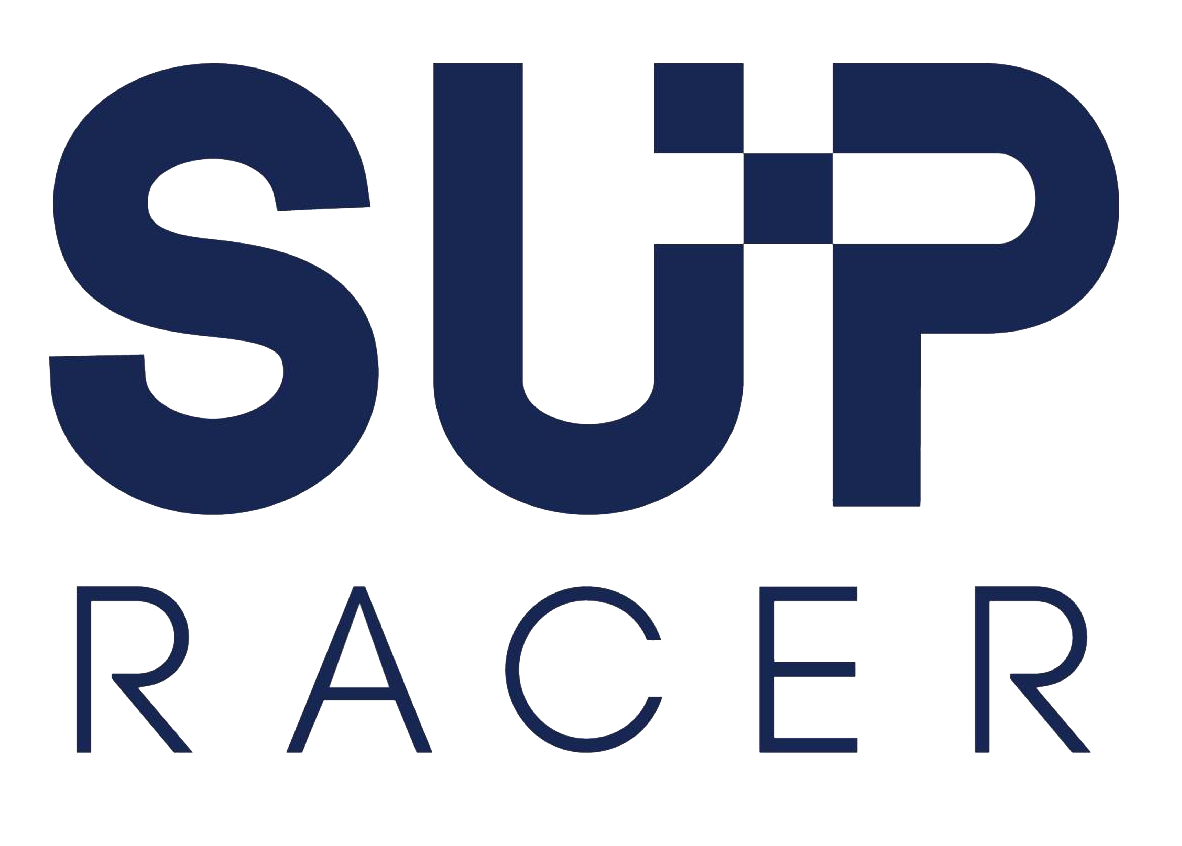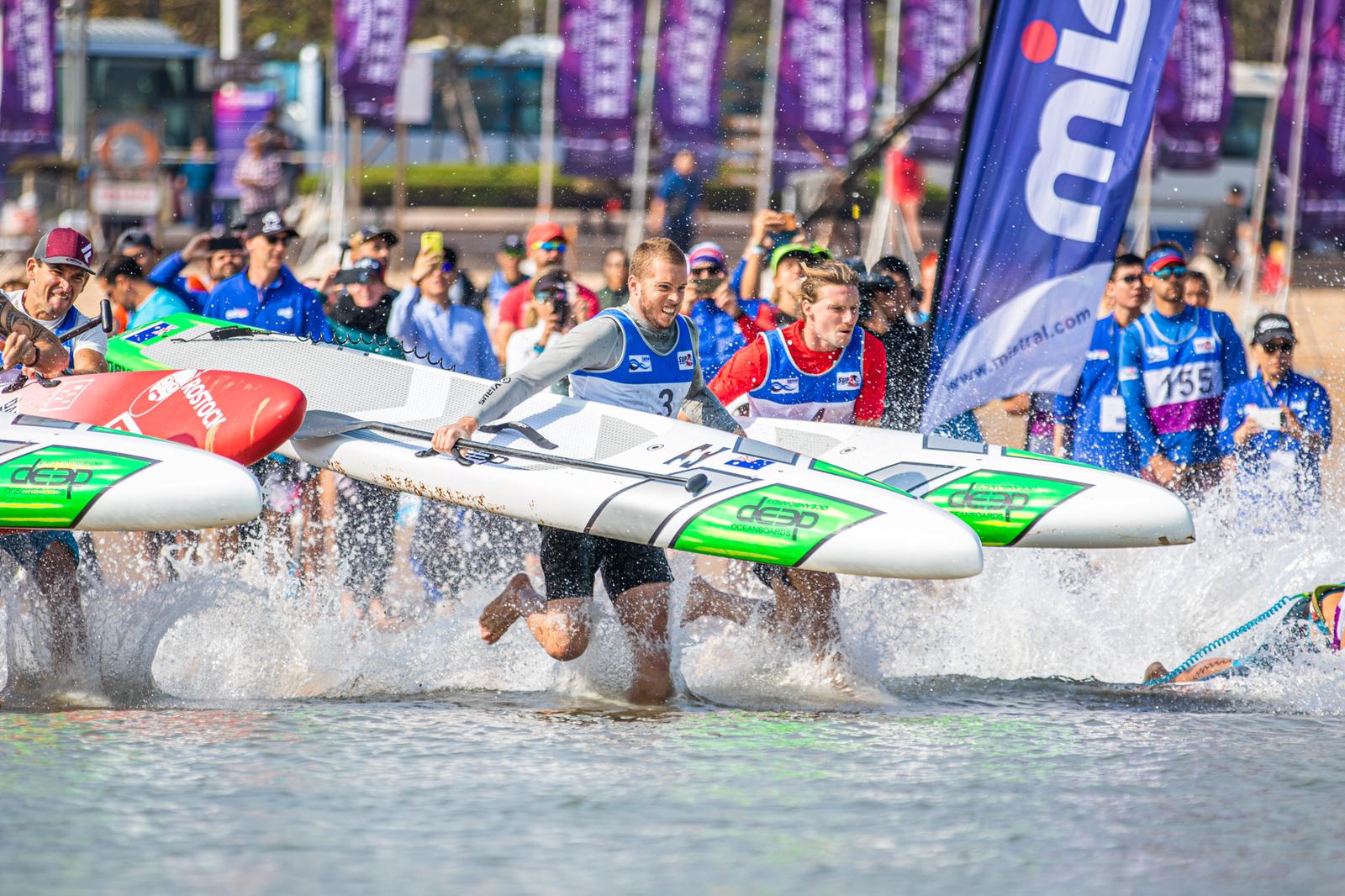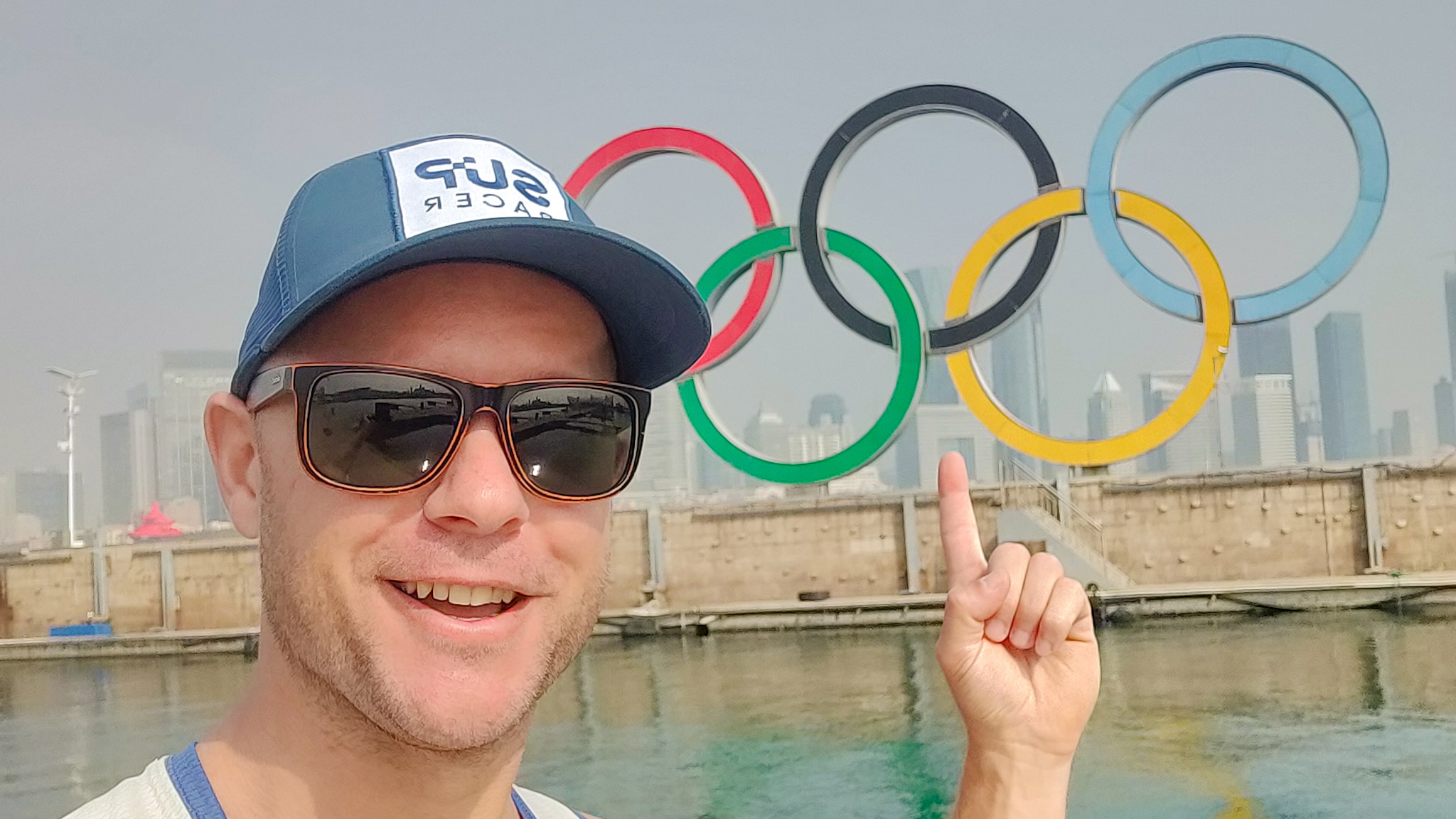
ICF Worlds: First impressions from Qingdao + when & where to watch the live stream
Welcome to China.
There’s been a lot of buzz around the ICF Worlds for a variety of reasons. So after arriving in Qingdao yesterday, and in the face of seemingly-insurmountable jetlag, I’m going to try to share my “first impressions” of this event, talk about what I got wrong in my earlier posts, plus tell you when and where you can watch the live stream that I’ll be hosting with Kelly Margetts.
My first impression is fairly simple: The inaugural ICF SUP World Championships are legit. This is shaping up to be a big event with a huge crew working behind-the-scenes to make it run smoothly. We’re still 48 hours from the first race, so I’ll reserve final judgement until after the weekend, but so far so good.
And the host venue. Damn. Qingdao is a modern city if ever I’ve seen one. The “Manhattan of China” they call it. It’s also known as China’s “Sailing City” after hosting the 2008 Olympic sailing regatta, an event that clearly had a lasting impact. Qingdao’s massive waterfront area is meticulously designed, while the Olympic marina would be a world-class venue for any event let alone a humble SUP race.
The first thing I noticed last night was a giant screen outside the Olympic sailing museum playing a SUP video on loop. Right next to that is the event board storage: dozens and dozens of 14 footers waiting right next to the water for paddlers to train on.
Many of those boards were shipped to Qingdao in a container after the ICF SUP World Cup in Scharbeutz, Germany four months ago. The boards were literally sent from the finish line of one major race to the start line of another — halfway round the world. The ICF has gone to great lengths to make logistics a non-issue, which has been hugely appreciated by athletes accustomed to playing “check-in roulette.”
And then there are the Olympic Rings.
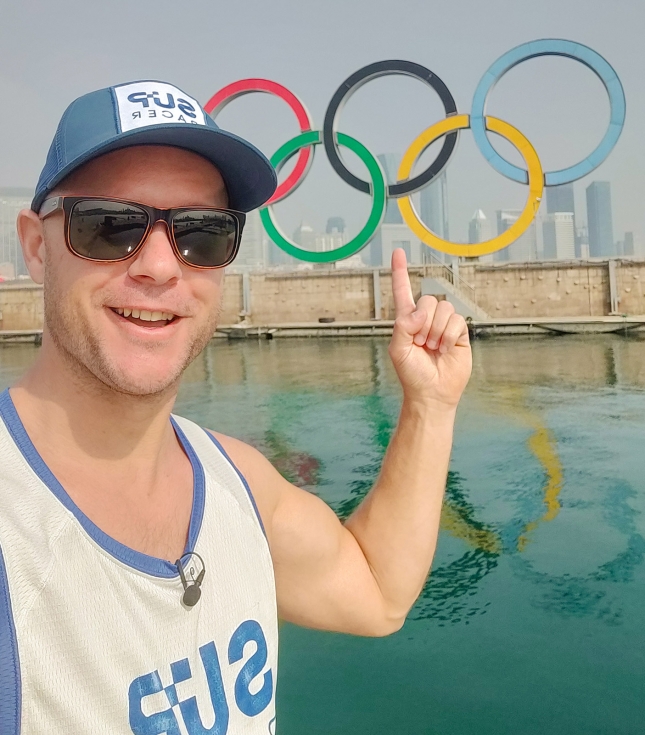
Say what you will about SUP in the Olympics (and I’ve said plenty myself), the Rings are an impressive symbol. They carry so much weight, so much history, so much significance in the sporting world and beyond that it’s hard not to stop, stare and simply be in awe of what those five circles represent.
With the ‘Olympic Paddletics’ debate swirling behind-the-scenes, it’s rather symbolic that the inaugural ICF SUP World Championships will be held literally right next to the Olympic Rings.
I’m still not convinced that SUP-in-the-Olympics is a even good idea, and nobody knows how the ICF v. ISA court case in Switzerland will play out anyway, but in the past 24 hours I have become convinced that the Olympics don’t necessarily matter in this debate: The ICF — and the wider canoe world in general — can do a lot for our sport whether we ever make ‘The Games’ or not.
The canoeing community can help us tap into so many new nations and new paddlers. There are tens of thousands of canoe clubs around the world, while canoe/kayak events — with all their history and prestige — often attract far more participants than your average SUP race despite our sport being far more user-friendly. There is so much potential for the canoe world to compliment the growth of SUP.
The same way that SUP reinvigorated many prone paddleboarding events in the early days, I think canoe can do the same for stand up paddling over the coming decade. We’ve already seen our sport piggyback on 1000-strong canoe races in Eastern Europe, while here in Qingdao for example there are 15-20 athletes who stayed in China after last week’s ICF canoe/kayak marathon world champs to compete at the SUP World Championships. Many of them have never raced in a serious SUP event, yet all of them are clearly world class paddlers who will go home and suddenly become new ambassadors to help push our sport to new frontiers.
This became even more apparent when I jumped on a boat this morning and joined the ICF SUP Development Camp that’s been running here in Qingdao the past week.
The Philippines, Romania, Egypt. These aren’t places you’d think of as being “SUP Nations,” yet here they are. The camp has offered the ‘minnows’ — the smaller nations that have a limited SUP history — a chance to learn from more seasoned countries and competitors while also cultivating an inclusive culture and team spirit that this event critically requires to be called a success.
The development camp has been a hit, with 15 nations represented and a clear atmosphere of fun and camaraderie.
I really sense that the ICF Worlds will become a melting pot of cultures. We’ve seen that before at the ISA Worlds, but I’m surprised at just how quickly the ICF has managed to make the SUP World Championships about the “nation” and not just the “individual.”
(I’m going to do my best to get some interviews with the minnows over the coming days.)
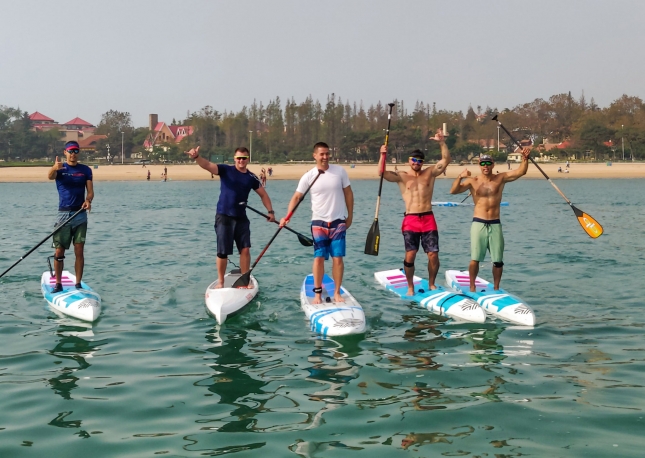
A few of the paddlers in the dev camp including coaches Andrey Kraytor and Tommy Buday Jr on the right (photo: @wheresbossman)
But perhaps the craziest stat of all is that entries for the ICF Worlds (which have been re-opened due to a surge of late interest) have reached nearly 200 paddlers from 37 nations.
The fact the ICF has nearly matched peak attendance for a major SUP championship (42 at the ISA Worlds in Denmark) in their inaugural event and in a place as difficult to reach as China shows the broad reach of the canoe world (for comparison’s sake, the ISA’s own in event in China 12 months ago had less than 30 teams).
Granted, 12 of those 37 nations have just one athlete competing (the “skeleton teams”), but either way it’s impressive. If/when the ICF SUP World Championships are held in Europe, which the rumour mill says will likely happen as soon as next summer, I predict there’d be at least 55 national flags flying.
Here’s the latest tally from Qingdao:
1. Argentina (1 athlete)
2. Australia (6 athletes)
3. Austria (2 athletes)
4. Brazil (5)
5. Bulgaria (1)
6. Canada (2)
7. China (64)
8. Czech Republic (2)
9. Denmark (2)
10. Egypt (2)
11. Estonia (1)
12. France (2)
13. Germany (12)
14. Greece (8)
15. Hong Kong (4)
16. Hungary (5)
17. Israel (7)
18. Italy (5)
19. Japan (6)
20. Latvia (1)
21. Macau (1)
22. Morocco (1)
23. Netherlands (1)
24. New Zealand (2)
25. Philippines (1)
26. Poland (1)
27. Portugal (2)
28. Romania (1)
29. Russia (3)
30. Serbia (1)
31. Slovenia (2)
32. South Africa (2)
33. South Korea (6)
34. Spain (2)
35. Switzerland (1)
36. Ukraine (2)
37. USA (3)
Something I got wrong in my preview last week was the national spirit among athletes. I really thought this would be more of an individual event where the pros were just showing up to cash a cheque and then go home. But while the decision to offer a $40,000 carrot is an interesting point of discussion (and contention, according to some), it’s clear that the vast majority of paddlers aren’t here for the money and are here for their country.
I’ve lost count of how many colourful team uniforms I’ve seen wandering around the Olympic marina and in-and-out of the official ICF hotels. I’ve stopped trying to learn names and simply started calling paddlers by their nation: “Hey Greece! Hey Macau!”
I also didn’t realise just how involved the national canoe federations have been. I’ve heard from many athletes that have had all their travel costs covered — even in the traditionally surf-focused nations such as France.
As you’d expect from the inaugural event, not everything is perfect. Far from it. There were a few grumbles when the schedule was rearranged with just a week to go, while the air quality here in Qingdao is “questionable” to put it politely (I saw at least one paddler training with a mask on this morning; my eyes are stinging as I write this). And of course there’s three full days of racing which is plenty of time for organisers to make mistakes.
But overall I’m impressed, and so is every international athlete I’ve spoken to so far.
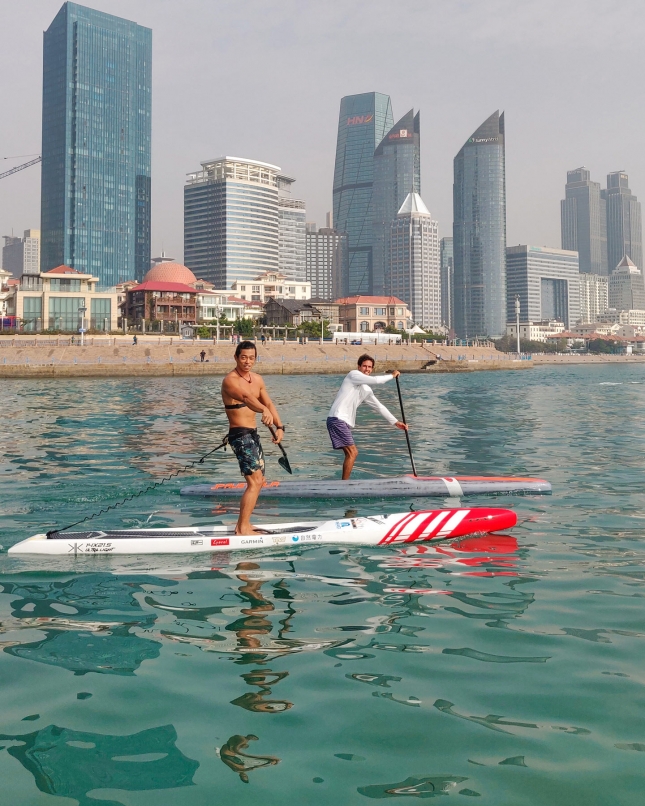
Kenny Kaneko from Japan and Brazil’s Vinnicius Martins training along the Qingdao waterfront this morning (photo: @wheresbossman)
I’m also very excited to announce that I won’t be holding a phone-and-gimbal for the live stream. Sorry, no more baguette microphone! (“chopstick microphone” perhaps?) The production setup here is world-class: I hear we’ve got 12 different cameras, several boats and two drones to cover the 18km distance race on Friday.
Speaking of which: Everyone has been asking when, where and how they can watch the live broadcast. So here’s the latest.
Things are a little tricky here in China — the “Great Firewall” blocks access to anything owned by Facebook and Google (among thousands of other sites), which makes accessing Instagram and YouTube rather difficult.
The good news is, the ICF found a solution and they’ll be live streaming the entire show on their official YouTube channel (‘Planet Canoe’) in full HD. I’ll embed the live streams right here on supracer.com but I also recommend you subscribe to Planet Canoe right now so you don’t miss a thing.
LIVE STREAM: WHEN TO WATCH
Here’s the official schedule:
Friday 9am: Distance race (18km)
Saturday 9am: Sprint heats
Saturday afternoon: Sprint semi-finals and finals
(exact start time TBD)
Sunday 9am: Beach race heats
Sunday afternoon: Beach race finals
(exact start time TBD)
9am Friday in China (long distance start time) =
3pm Thursday in Hawaii
6pm Thursday in California
8pm Thursday in Peru
9pm Thursday in Florida
10pm Thursday in Brazil
2am Friday in the UK
3am Friday in South Africa
3am Friday in France
3am Friday in Germany
3am Friday in Italy
4am Friday in Greece
4am Friday in Israel
8am Friday in Thailand
9am Friday in Australia (West Oz)
10am Friday in Japan
11am Friday in Australia (QLD)
12pm Friday in Australia (NSW/VIC)
12pm Friday in New Caledonia
2pm Friday in New Zealand
LIVE STREAM: WHERE TO WATCH
The live broadcast will be streaming on the official ICF YouTube channel (‘Planet Canoe’) and we’ll be embedding the streams here on supracer.com
LIVE STREAM: WHO TO WATCH
I’m looking forward to seeing some new names punch above their weight, and I’m also excited to see how well the canoe/kayak crew do against the SUP champions. But for the most part, I expect the big names from the SUP world to dominate the top positions. Here’s who to watch out for (though not all athletes are doing all three races).
I predict the distance race will be a shoot-out between Boothy and Bruno (replay of Bilbao?) with a massively-talented chase pack right behind them. It’s going to be very tough just making the top 10 in this race — there’s a world-class group of paddlers here in Qingdao. The women’s race is also tough to predict with the likes of Olivia, Sonni, Lena, Susak and Fiona all on the line.
It largely depends on conditions though. The marina area can get very choppy when the wind and distant boat wakes bounce off the concrete walls, but it looks like we’ll have a light offshore breeze and hopefully minimal boat traffic, so it’s probably going to be an 18km flat-water grind and therefore a tight draft train out front. Board choice will become important.
The sprints are going to be a crap-shoot. It’s a 200 metre race that’s sort of going to be held in lanes. The format that I heard described is unique to say the least: There will be 4 or 5 wide lanes with 4 or 5 paddlers in each. I’m not sure how that’ll play out in reality, but it actually sounds kind of fun to watch. Arthur Santacreu from Brazil won the gold at the ISA Worlds 12 months ago but there’s close to a dozen guys who could steal it.
The beach race (or “technical course race” as it’s more boringly known) will be another toss-up. You’d wanna say Lincoln will take favouritism in the men’s but you could probably throw a blanket over the top 7 or 8 guys. Same for the top half a dozen women. Should be a good show and a fun way to finish off the event on Sunday afternoon.
(One thing that’s missing is a team relay — hopefully next year the ICF adds at least one nations-based event.)
The Top 10 Contenders
Australia: Michael Booth, Ty Judson, Lincoln Dews, Jackson Maynard
Brazil: Lena Ribeiro, Vinni Martins, Arthur Santacreu
Canada: Jack Seymour, Tommy Buday Jr
France: Olivia Piana, Martin Vitry
Germany: Sonni Honscheid, Hannah Krah, Tanja Ecker, Sebastian Brendel
Hungary: Bruno Hasulyo, Daniel Hasulyo
Israel: Liran Machlev
Italy: Caterina Stenta, Leo Nika, Claudio Nika, Paolo Marconi, Martino Rogai
Japan: Kenny Kaneko, Rai Taguchi, Kei Komatsuyama, Takayo Yokoyama, Rika Okuaki
Latvia: Arvis Iljins
Netherlands: Joep van Bakel
Russia: Andrey Kraytor
South Africa: Tarryn King
Switzerland: Siri Schubert
Ukraine: Olekseii Sidenko
USA: Fiona Wylde, Connor Baxter
Dark horses: There are too many dark horses to even mention. That’s one of the things I’m most excited to watch, especially the canoe guys and girls that might take down a few more well-known scalps.
Whatever happens, we’ll be calling every minute of the action.
See you on Friday.
